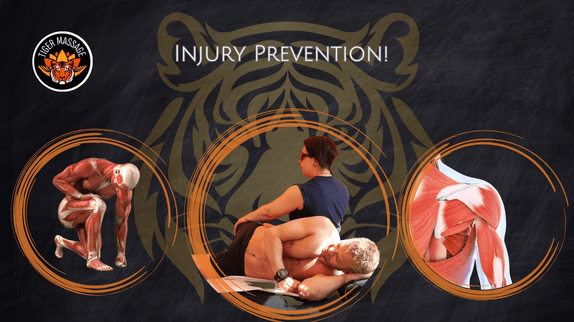I have been a Soft Tissue Therapist for about 5/6 years now and before that I was a Personal Trainer. I myself have a passion for Boxing and Weight Lifting, and I’ve spent a lot of money in yoga studios and earned a brown belt in kick boxing over the years. Having been injured before, I can tell you its not a place I want to go back to, especially not now as an entrepreneur in the wellbeing industry, if I’m injured I can’t work, if I can’t work, I can’t earn money and if I can’t do that, I cant play hard and that would be a disaster for my mental health as well as my physical wellbeing, not to mention my business! I injured myself because I ignored a few the points below, and I took on new training modalities with ego and compromised form and technique, I wore inappropriate clothing and basically did not take care of my own body mechanics at work. If you want to maximize your chances of staying injury free you need to understand what can cause injury in the first place! Here’s a few things you can do very easily to help reduce the chances of getting injured!
Not drinking enough water! If your urine looks like a pint of ale you need to drink more water! Water helps lubricate the joints and the soft tissues and various other neat little structures that need to stay supple, it also helps with recovery by optimising blood circulation which means your body can deliver nutrients at a better rate!
Going to hard too quick and not building up your levels of fitness, be it strength or stamina. Shin Splints is a perfect example; often caused by going at it too hard for too long, too quickly without a steady program build up! All training modalities should be based on progressive overload, emphasis in the word progressive.
Wearing inappropriate clothing! Yes folks, I once caused my patella (the knee bone) to maltrack wearing shoes that were unsupportive for deadlifting and squatting. Though this is not necessarily the same for every individual, getting a postural assessment done will give you a better understanding of your bodies specifics and so prevent this sort of thing from happening. You are better off deadlifting barefoot because you’ll get better proprioceptive feedback and therefor pay more attention to your body mechanics than wearing inappropriate footwear or clothing that will not support your body. If you're planning to run a marathon for instance don't wear new footwear on the big day, get your gate checked, get the right shoes for you and bed them in!!!
Not acclimatising to the conditions, choose your terrain wisely! If you are gunning for a triathlon and you know the swim is outdoors (in the Brighton sea for instance) choose a swim location that might replicate that environment, minimise the risk factors that might affect your performance on the day and therefor cause you enough bother during your comp to distract you and lead to avoidable injury. Similarly to going in too hard too quick, build up a tolerance for the terrain, if you are new to running outdoors, take it slowly regardless what distance you usually go on the treadmill – take the time to adjust!
Not conditioning yourself! Work on a balanced fitness programme, speak to a PT and book some sessions! Undulate the different aspects of fitness; 4-6 weeks hypertrophy followed by 4-6 weeks strength work for instance, build your endurance over a scheduled and measurable period and learn correct technique! Sometimes that can be class appropriate, if you're going for high metabolic conditioning classes at cross fit clubs, pace yourself, don’t go hell for leather in the first 30 seconds and then fail the rest of the class. Build up slowly and measure your progress!
Don’t skip stretching! Obviously appropriate warm ups should be done before training (static stretching isn’t great before training) but part of your routine should always be stretching - as is appropriate to the exercises you’ve just done and more specifically to your body; for me its always low back as I have a ‘lordotic’ posture type coupled with a very minor scoliosis in the lumbar vertebrae means that especially after a heavy deadlift session I have to stretch my low back. Its essential! If you find stretching boring I strongly advise you to find a gentle yoga practise. I stress the word gentle practise as this should not be another intense class on top of all other intense exercises; your yoga practise should bring balance to your active lifestyle choice by reducing stress hormones released during intense activity, connecting you with your breath - which will always serve you well during training, and most importantly turning your focus onto your own body mechanics! My good friend Charlie Nash from MindfulbodyYoga runs the perfect class that will match my suggestion for those of you who are Brighton/Hove based.
Take time out! Everyone should have 1 week out of a consistent training schedule for complete rest and recovery! Women in particular may find it useful to time this with their menstrual cycle, there’s plenty of info out there that can guide you around the various phases that will minimise injury risk. Rest & Recovery on the whole need to be taken as seriously as good training program and nutrition to match. Your body needs to rest and recover in order to grow and get stronger!
🤲🏻Be your best•🐅 Be your very best•🐅Be More Tiger 🤲🏻
